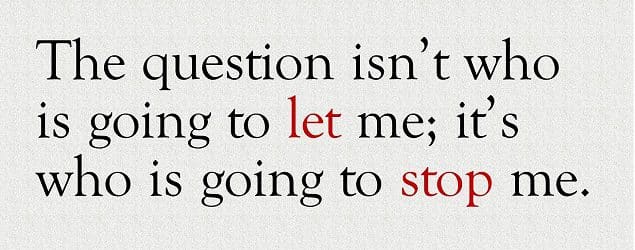“Objectivism Is About a Love for Productive Ability”
Here’s a partial transcript of Onkar Ghate’s remarks on the core essence of individual rights:
[T]he foundational principle of politics, of individual rights, is focused on human ability. That’s the essence, and the core of the principle. It’s a means at a political/social level of unleashing ability, of giving it the freedom to function, and giving the individual the freedom to develop, to use, and then to gain the rewards of his ability. That’s what individual rights are about. They have to be formulated in the positive. It’s the right to life, to liberty, to property, to the pursuit of happiness. They’re formulated in terms of the positive because that’s the core — they’re core, and why they’re needed, why they’re originated, and what their function is.
So it’s not the right to commit suicide, practice astrology, gamble my money away on roulette, and loaf all day in my pajamas. Even though there’s a sense in which the rights encompass that a person could do those things, that is not what rights are about. So if you empty rights of their metaphysical / moral content, and orientation — as I put it for Locke: it’s about protecting the rational and the industrious. To understand, that’s the whole motivation for the issue of rights. That’s how they have to be defended. . . .
So if you treat them as neutral or negative, it’s a disaster, even if what you’re saying is true. So it’s true that rights are in part about the absence of the initiation of force. But that’s not their core. The initiation of force is an evil. The absence of it doesn’t get you to something good. It doesn’t tell you what rights are, it doesn’t tell you why force is evil. . . .
Or if you think of the common formulation, you get this from libertarians and many others: Do whatever you feel like doing, so long as you respect the same rights of others. . . .What’s so important about that? Why think that’s valuable? Why are you mounting a crusade for that? There’s no answer to those questions.
Or another kind of formulation that is often given: My right to swing my fist ends where your nose begins. Now there is a use to that kind of formulation. The issue of the demarcation of rights is important. But if this is all you’ve got, it doesn’t convince anyone, and it shouldn’t convince anyone. I mean, the image it portrays is that I’m walking around swinging my fists, and I can’t do that if your nose is there. Why do I want to do that? Why is that what life is about? There’s no answer to that question. And Ayn Rand never looks at rights like this, even though she will use formulations like it’s about the absence of the initiation of physical force. That’s not the essence of the case for rights. . . .
Objectivism is about a love for productive ability, or you could even say — and this is the way Ayn Rand formulates it — it’s about a reverence for productive activity.
Onkar Ghate is senior fellow and chief content officer at the Ayn Rand Institute. This talk, “Productive Achievement: Man’s ‘Noblest Activity,’’ was delivered at Objectivist Summer Conference 2017 in Pittsburgh, Pennsylvania, on Saturday, June 10, 2017.



